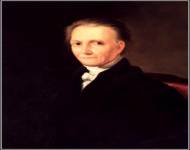Early Life
The nephew of George Washington, Bushrod Washington was born on June 5, 1762, in Westmoreland County, Virginia. He attended the College of William & Mary, where he graduated in 1778 at age sixteen as one of the first members of Phi Beta Kappa.
When the Revolutionary War began, Washington enlisted as a private soldier and was later present at the surrender of Cornwallis in Yorktown. Following the war, Washington studied law in Philadelphia and began his practice in Alexandria, Virginia. During this time he worked with James Wilson, a future Associate Justice of the Supreme Court.
While working as a lawyer in Virginia in the late 1780s and early 1790s, Washington served two terms on the Virginia House of Delegates, the committee that ratified the constitution, from 1787 to 1791.
Supreme Court
When Justice James Wilson died in August 1798, President Adams first looked towards John Marshall to fill the vacant seat. However, Marshall denied the nomination and endorsed Washington. Adams officially appointed Washington on December 18, 1798, and Washington began his post as Associate Justice two days later.
Although Justice Washington served over thirty years on the Supreme Court, he typically remained reserved in voicing his opinions. After John Marshall became Chief Justice in 1801, Washington was quick to follow his lead, only voting differently three times in the next thirty years. Washington only dissented twice during his time on the Supreme Court.
One occasion Washington voted differently than Marshall was in the 1827 Ogden v. Saunders case regarding bankruptcy law in connection with the U.S. constitution. Washington authored the first part of the opinion, maintaining that a law passed before the execution of a future contract is a valid part of that contract.
In the 1823 Corfield v. Coryell case regarding commerce laws for non-residents, Washington maintained that the Privileges and Immunities Clause guarantees people only the rights that are essential to citizenship. These rights, he argued, do not include granting all out-of-state residents the same rights as lawful state residents.
Death
Justice Washington served on the Supreme Court until his death on November 26, 1829. He was buried in Mount Vernon with his wife Anna.









